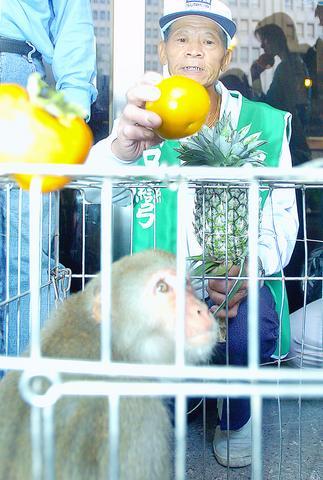More than 200 farmers from central Taiwan appealed yesterday to the Legislative Yuan and the Council of Agriculture to address problems caused by the Formosan macaque.
The farmers, accompanied by Chinese Nationalist Party (KMT) Legislator Tseng Tsai Mei-tsou (

PHOTO: LIAO CHEN-HUI, TAIPEI TIMES
The farmers complained that the monkeys take their fruit, ravage farmland, and even sometimes harass women and children.
They asked the government to consider taking the monkeys off the conserved animal list and that the council also compensate them for their crop losses.
They said that although the macaques repeatedly wreak havoc on farmland, they cannot be rounded up or killed because they are protected animals -- so the only way to deal with them is to chase them away.
They suggested that the COA conduct a comprehensive count of the animals to investigate their numbers and consider removing them from the protected animal list.
The farmers later went to the council with their requests. In addition to compensation for crop losses and removal of the monkeys from the protected list, they also suggested that a tourism zone be set up to shelter the macaque.
They brought with them two rock macaques in cages, along with pineapple plants damaged by the macaques and pointed out how the animals gnaw the roots of the plants, seriously affecting the crop.
Council Vice Chairman Tai Chen-yao (戴振耀) said the council would set up a task force to investigate the damage and study ways of subsidizing the farmers.

Alain Robert, known as the "French Spider-Man," praised Alex Honnold as exceptionally well-prepared after the US climber completed a free solo ascent of Taipei 101 yesterday. Robert said Honnold's ascent of the 508m-tall skyscraper in just more than one-and-a-half hours without using safety ropes or equipment was a remarkable achievement. "This is my life," he said in an interview conducted in French, adding that he liked the feeling of being "on the edge of danger." The 63-year-old Frenchman climbed Taipei 101 using ropes in December 2004, taking about four hours to reach the top. On a one-to-10 scale of difficulty, Robert said Taipei 101

A preclearance service to facilitate entry for people traveling to select airports in Japan would be available from Thursday next week to Feb. 25 at Taiwan Taoyuan International Airport, Taoyuan International Airport Corp (TIAC) said on Tuesday. The service was first made available to Taiwanese travelers throughout the winter vacation of 2024 and during the Lunar New Year holiday. In addition to flights to the Japanese cities of Hakodate, Asahikawa, Akita, Sendai, Niigata, Okayama, Takamatsu, Kumamoto and Kagoshima, the service would be available to travelers to Kobe and Oita. The service can be accessed by passengers of 15 flight routes operated by

Taiwanese and US defense groups are collaborating to introduce deployable, semi-autonomous manufacturing systems for drones and components in a boost to the nation’s supply chain resilience. Taiwan’s G-Tech Optroelectronics Corp subsidiary GTOC and the US’ Aerkomm Inc on Friday announced an agreement with fellow US-based Firestorm Lab to adopt the latter’s xCell, a technology featuring 3D printers fitted in 6.1m container units. The systems enable aerial platforms and parts to be produced in high volumes from dispersed nodes capable of rapid redeployment, to minimize the risk of enemy strikes and to meet field requirements, they said. Firestorm chief technology officer Ian Muceus said

MORE FALL: An investigation into one of Xi’s key cronies, part of a broader ‘anti-corruption’ drive, indicates that he might have a deep distrust in the military, an expert said China’s latest military purge underscores systemic risks in its shift from collective leadership to sole rule under Chinese President Xi Jinping (習近平), and could disrupt its chain of command and military capabilities, a national security official said yesterday. If decisionmaking within the Chinese Communist Party has become “irrational” under one-man rule, the Taiwan Strait and the regional situation must be approached with extreme caution, given unforeseen risks, they added. The anonymous official made the remarks as China’s Central Military Commission Vice Chairman Zhang Youxia (張又俠) and Joint Staff Department Chief of Staff Liu Zhenli (劉振立) were reportedly being investigated for suspected “serious